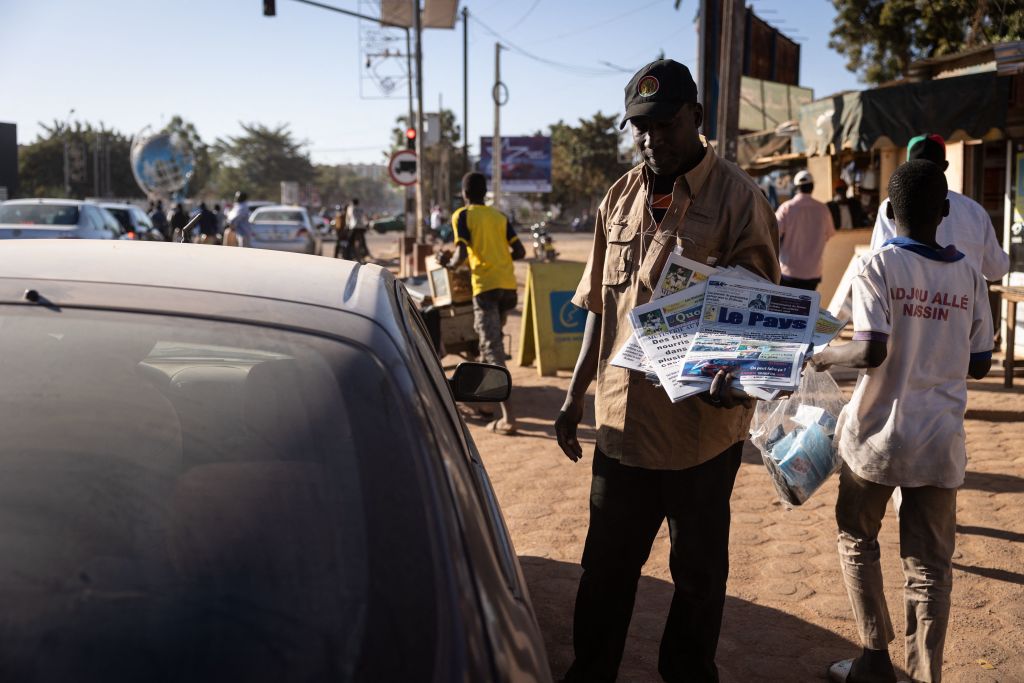Faced with continuing terror attacks, Burkina Faso’s ruling military junta has tried to silence citizens and journalists who report on or criticize its actions.
Security Minister Mahamadou Sana recently issued a warning on Facebook against citizens liking or sharing content that the junta considered to be incitement of terrorism.
Sana based the warning on what he described as “malicious content in the form of posts, photos or videos inciting terrorism and conveying false news” on social media.
Terrorist groups frequently post videos or reports of their attacks on government forces to social media. Those accounts often contradict the government’s official reports of the same events.
“Incriminating content is being investigated with the aim of identifying and arresting the authors who will be subjected to the rigors of law,” Sana said.
Burkina Faso law makes promoting terrorism and spreading what the government describes as “false information” punishable by one to five years in prison. While junta leaders say they are targeting terrorism, critics say the government is using the law to suppress dissent.
“Placing exiled journalists and activists on a terrorist list is a blatant attempt to intimidate them and could have a chilling effect on their work,” Ilaria Allegrozzi, senior Sahel researcher for Human Rights Watch, wrote.
The crackdown on social media is part of a three-year campaign against independent media as the junta seeks to suppress dissent and control the narrative around its struggle to rein in extremists who control large parts of the country.
Shortly after taking power in 2022, the junta led by Capt. Ibrahim Traoré began blocking French-language news broadcasters, forcing foreign journalists out of the country and shutting down access to outside media websites.
TV5Monde, for example, was blocked in 2024 after reporting on a Human Rights Watch report claiming that Burkina Faso’s army executed at least 223 civilians, including at least 56 children, in two northern villages. More than a dozen foreign news outlets were suspended or blocked for reporting on the suspected massacre.
In late March, Burkina Faso’s ruling military junta arrested the leaders of the country’s journalist association along with a prominent television reporter.
The families and colleagues of Guézouma Sanogo, Boukari Ouoba and Luc Pagbelguem had no idea of their whereabouts after their March 24 arrest. Their arrests came after a news conference that criticized the junta’s ongoing crackdown on independent media and criticisms in online forums such as social media. At that same meeting, Sanogo called for the junta to release four other journalists who had been abducted and conscripted in 2024.
On April 2, the government produced a video showing the men dressed in camouflage clothing with their heads shaved. The junta has previously conscripted judges and attorneys who criticized the government.
Sadibou Marong, Sub-Saharan Africa director for the nongovernmental agency Reporters Without Borders (RSF), denounced the Burkinabe junta’s arrest and conscription of journalists.
“It is clearly a message intended to intimidate the entire profession and foster self-censorship,” Marong said in a statement. “Forcing journalists to relay state propaganda under duress is an unacceptable violation of press freedom, revealing a regime unable to tolerate criticism.”
Burkina Faso has been plagued by attacks from extremist groups tied to al-Qaida and the Islamic State group since 2015. Military coups in 2022 overthrew the elected government based on the claim that only the military could do a better job of stopping terrorist attacks.
Since then, violence has increased dramatically, making Burkina Faso the world’s top country for terrorism, according to the Global Terrorism Index.
“Questions about military rule efficacy are getting louder,” Ouagadougou-based analyst Pierre Wendpuire recently wrote for The Continent. “President Traoré would rather not hear criticism of his security policies.”
The junta’s crackdown on journalists and citizens on social media has left Burkina Faso’s media environment flooded with pro-government propaganda, according to critics.
One Burkinabe journalist in exile told Human Rights Watch: “Burkina Faso’s relentless descent into large-scale violence is not getting the scrutiny and media coverage it deserves domestically because independent media outlets have been silenced.”

